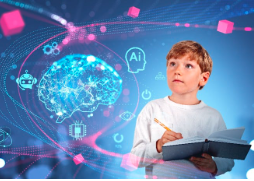In recent years, the educational landscape has undergone a major transformation, with online learning becoming more prevalent than ever. As we adapt to digital classrooms, one of the most exciting developments in this field is the integration of Artificial Intelligence (AI). But how exactly is AI shaping the way we learn online, and what impact does it have on students and educators alike?
1. Personalized Learning Experience
One of the most significant benefits of AI in online learning is its ability to create a personalized learning experience. Traditional classrooms often struggle to cater to the individual needs of every student, but with AI, online platforms can tailor lessons, quizzes, and learning resources to suit each learner’s pace and style.
AI-powered tools analyze students’ progress and adapt content to match their strengths and weaknesses. This approach helps students grasp concepts at their own pace, providing targeted interventions when needed and allowing them to progress faster in areas where they excel. For example, an AI system might suggest additional practice exercises or simpler explanations for a student struggling with a particular topic.
2. Intelligent Tutoring Systems
AI is also paving the way for intelligent tutoring systems (ITS), which act as virtual tutors. These systems use sophisticated algorithms to simulate the one-on-one attention a student might receive from a human tutor. The ITS can identify areas where a student is struggling and provide personalized support, explanations, and resources to help them succeed.
While ITS does not replace human educators, it complements their efforts, helping to ease the workload by addressing students’ individual needs. This technology ensures that no student feels left behind, even in large online classes.
3. Data-Driven Insights for Educators
For educators, AI offers a treasure trove of data-driven insights. AI tools collect and analyze vast amounts of data on student performance, engagement, and behavior, providing teachers with real-time feedback on how their students are progressing. This allows educators to make informed decisions about lesson plans, interventions, and areas that may need more attention.
With AI, educators can gain insights into student engagement levels, identify patterns, and assess learning outcomes more effectively than ever before. These insights enable teachers to make timely adjustments to their teaching strategies, fostering a more efficient learning environment.
4. Enhancing Accessibility and Inclusivity
AI is playing a key role in making online learning more accessible to students with diverse learning needs. AI-powered tools such as speech recognition, language translation, and text-to-speech systems can break down barriers, enabling students with disabilities or language challenges to fully participate in the learning process.
For example, AI-powered language translation tools can help students who speak different languages understand course materials in their native tongue. Text-to-speech technology can assist visually impaired students by reading course content aloud, while speech recognition can aid those with physical disabilities by allowing them to interact with the platform using voice commands.
5. Automating Administrative Tasks
AI also simplifies administrative tasks, which are often time-consuming for educators. From grading assignments to managing schedules, AI can automate various aspects of the educational process, freeing up time for educators to focus on teaching.
Automated grading systems powered by AI can quickly assess multiple-choice or short-answer questions, providing instant feedback to students. This reduces the burden on educators and ensures that students receive prompt evaluations.
6. Preparing Students for the Future
The role of AI in online learning extends beyond the classroom. As AI continues to revolutionize various industries, students need to develop skills that will prepare them for a future in a tech-driven world. By incorporating AI into online learning, students are not only gaining knowledge in their chosen subjects but are also becoming familiar with the tools and technologies that will shape the future of work.
7. Ethical Considerations and Challenges
Despite the many advantages AI offers in education, it’s important to approach its use with caution. The use of AI in online learning must be balanced with ethical considerations, including data privacy, transparency, and the potential for bias in AI algorithms. It’s crucial that educational institutions and tech developers work together to create AI systems that are fair, secure, and respect student privacy.
Additionally, while AI can support learning, it cannot fully replace the human connection and mentorship provided by teachers. Educators will continue to play a vital role in the emotional and social development of students.
Conclusion
Artificial Intelligence is undoubtedly reshaping the online learning experience. From personalized lessons to intelligent tutoring systems and enhanced accessibility, AI is making education more engaging, efficient, and inclusive. However, as we embrace the potential of AI in education, we must remain mindful of its challenges and ensure its ethical use.
As AI continues to evolve, its role in online learning will likely expand, offering even more opportunities to improve how we teach and learn in the digital age. Ultimately, AI will not replace the teacher but will empower both students and educators to achieve more.














